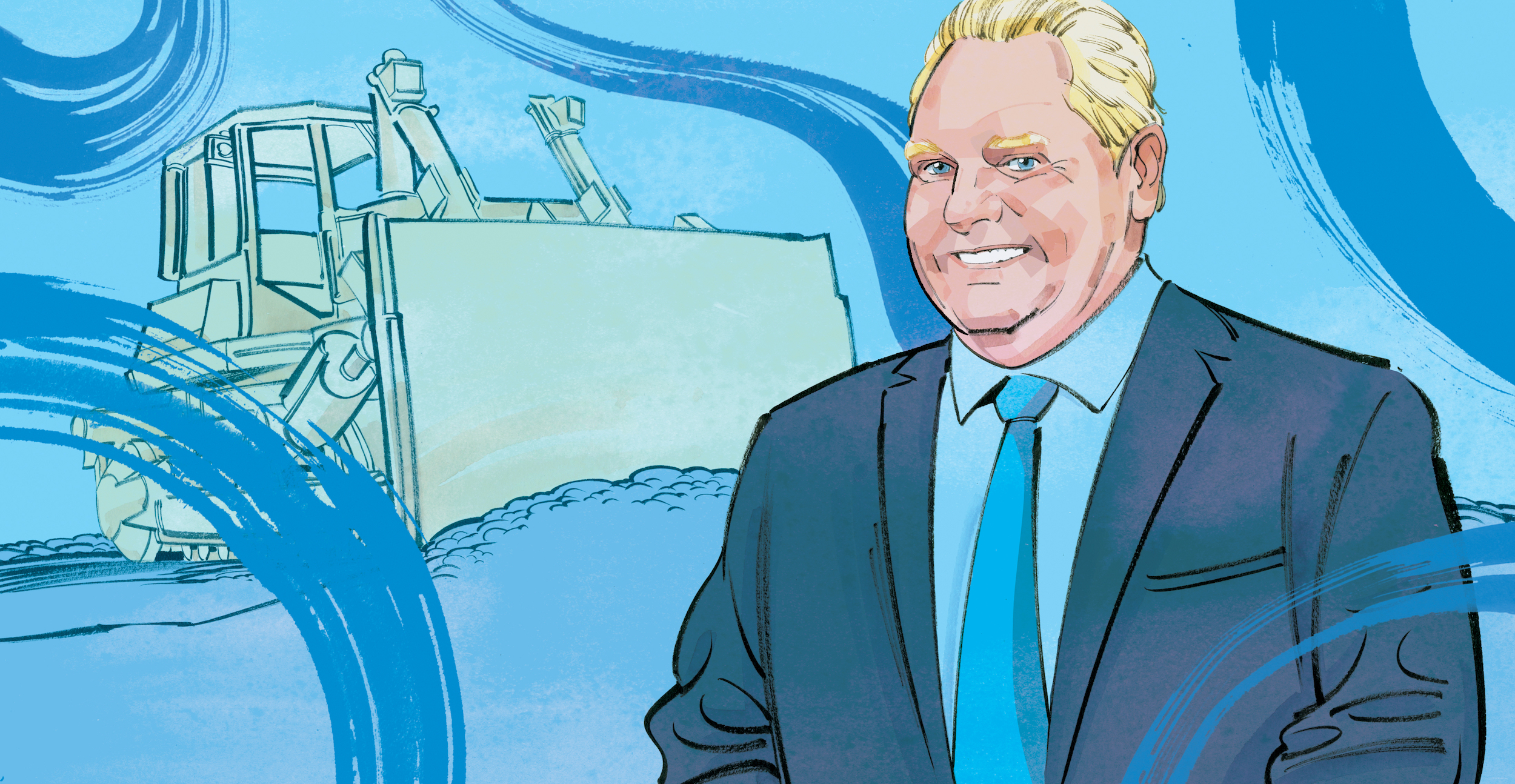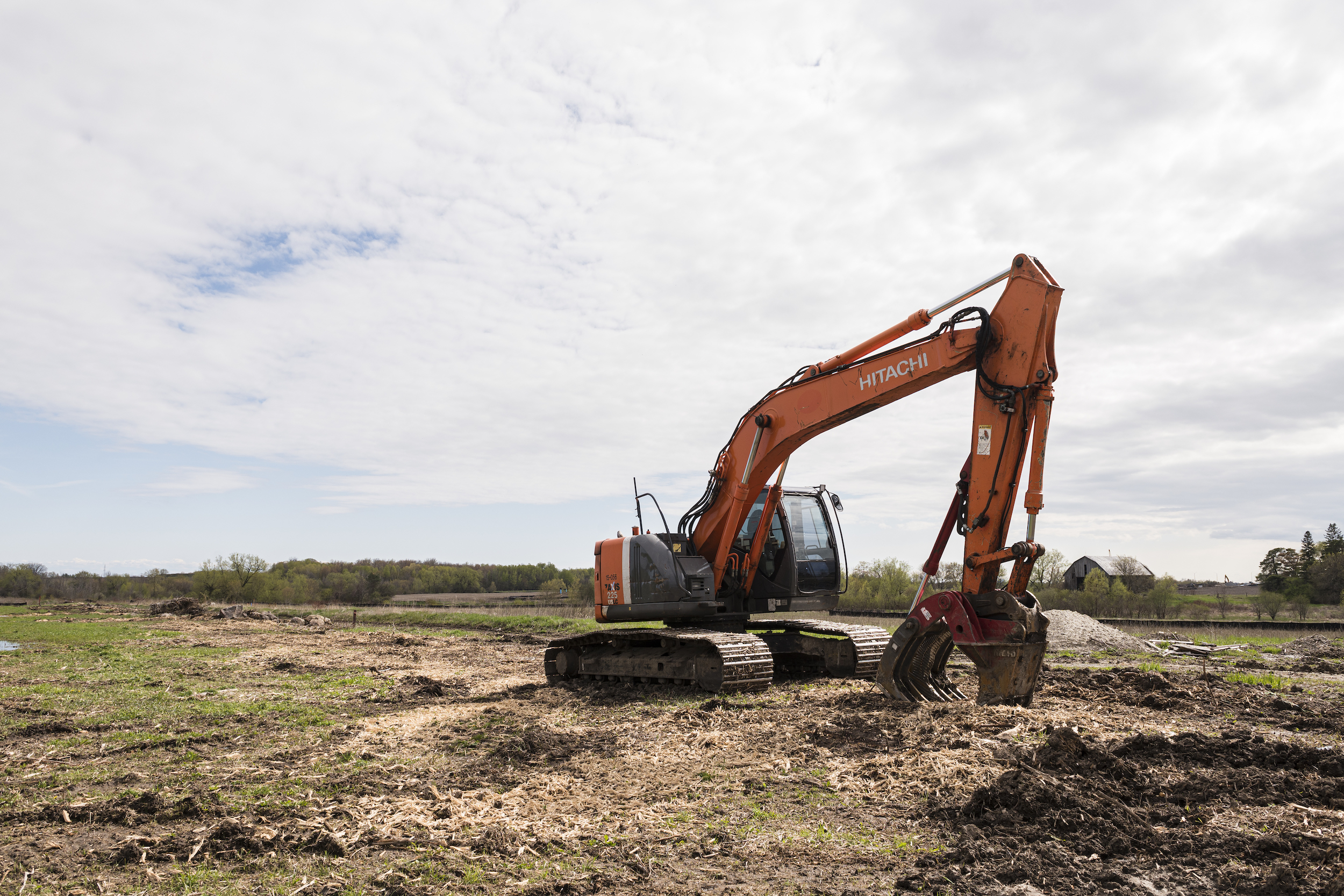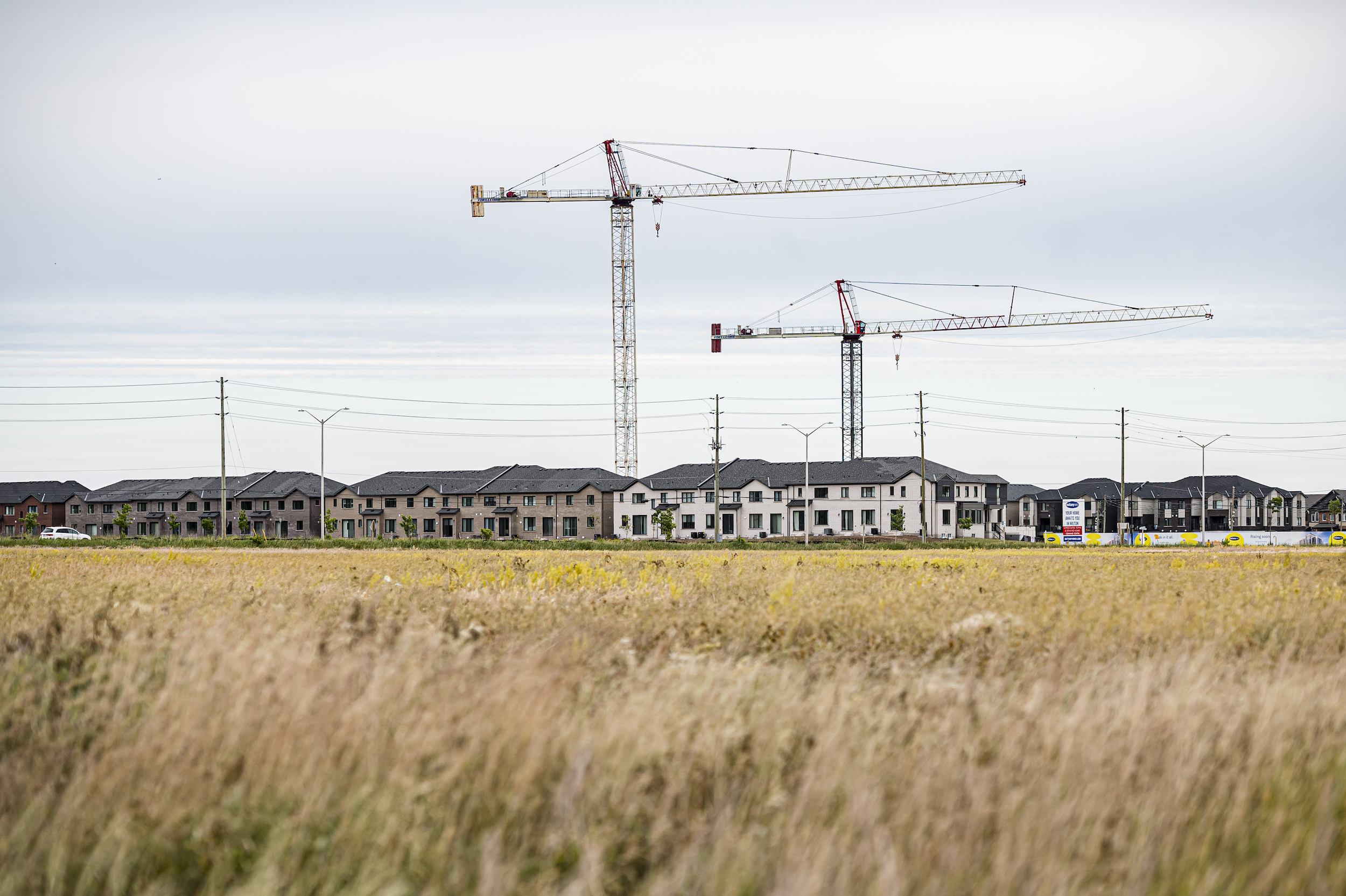
Celebrating 7 years of The Narwhal — and gearing up for the next 7
Between a fresh take on engagement and our new life on video, our team is...
Ontario Housing Minister Steve Clark had his “head in the sand” about how the Greenbelt was opened to development, integrity commissioner J. David Wake has declared, saying Clark had breached provincial ethics rules around conflicts of interest and insider information.
On Aug. 30, Wake released his long-awaited report on the Progressive Conservatives’ controversial move to drop protections on 3,000 hectares, or 7,400 acres, of the Greenbelt last fall. As reported by The Narwhal and the Toronto Star, the move benefited powerful developers with multiple ties to Premier Doug Ford and his party, some of whom had bought land just weeks before the decision was announced.
Wake’s investigation homes in on Clark’s former chief of staff, Ryan Amato, who he paints as the ringleader of a “chaotic and almost reckless process” that led to “the creation of an opportunity to further the private interests of some developers improperly.” But while it may have been Amato, not Clark or Ford, that directly instructed public servants to open land belonging to the developers in question, Wake found that Clark’s ignorance is not a virtue.
“I find that his lack of awareness was also an aggravating element since he should have provided greater supervision and control over this significant undertaking entrusted to his ministry,” Wake wrote.
While a request from NDP Leader Marit Stiles is what led to Wake’s investigation, he reported receiving “several hundred emails … calls and social media messages requesting that I investigate the matter.”
The commissioner noted he does not have the ability to reverse the Greenbelt decision: while he could recommend the legislature suspend Clark or remove him from his seat, Wake only suggested the minister be publicly reprimanded for breaching the Members’ Integrity Act.
“As minister, the buck stops with me and I accept the integrity commissioner’s findings,” Clark said in a statement released after Wake’s report was made public. “There were clear flaws in the process that led to [the Aug. 30] report. I am fully committed to fulfilling our government’s promise to build at least 1.5 million homes and will ensure the process is done with integrity and trust.”
In his own statement after the report was released, Ford made no mention of disciplining Clark or of reversing the Greenbelt decision. However, hours later, the government announced it was returning some of the opened lands to the Greenbelt: a parcel in Ajax that the Star reported had been listed for sale, even though the justification for opening the protected lands is the need for immediate residential development.
The following day, a grim-faced Clark, who usually doesn’t shy away from confrontation, was unusually subdued. As reporters shouted questions at the embattled minister — asking why he won’t redo the Greenbelt process properly, why he is still falsely claiming protected land was needed to build housing, whether he’s shielding Ford, whether the premier set him up to fail, whether he knowingly turned a blind eye what Amato was doing — he dodged. “I accept responsibility,” he repeated over and over, staring straight ahead, his voice unsteady at times.
“To Ontarians, I’m going to say very sincerely that I apologize.”
The moment stood in stark contrast to a testy press conference with Ford hours earlier, where the premier lashed out at reporters who questioned him and developers who defied him, sidestepping calls for accountability and repeating talking points about the province’s housing crisis before abruptly cutting the question session off early.
Meanwhile, opposition leaders questioned the silence from the Progressive Conservative caucus at large. “Do we have 28 ostriches up in the cabinet room? Did everybody stick their head in the sand?” Ontario Liberal Leader John Fraser asked.
Wake spoke to 61 people for the report, which wound through the Regina airport, a Raptors game (allegedly), golf courses (or maybe not) and a dinner already made infamous in auditor general Bonnie Lysyk’s own Aug. 9 report on the scandal — a building industry shindig where Amato was handed packages outlining parcels of land that developers wanted taken out of the Greenbelt. Weeks later, protections were dropped on all of them.
While much of the report treads the same ground as Lysyk’s, there are also new, damning details — such as Wake’s belief that Amato lied about Ford instructing him to consider certain parcels of land, as ammunition for overriding planners and experts during the selection process. Wake also documented a variety of ethical breaches, from small ones such as a lobbyist buying lunch for ministerial staff, to biggies like the leaking of insider information. He also noted contradictions in the information he received from Clark, Amato, other ministerial staff, the developers and Ford himself.
Here are the biggest bombshells from its 165 pages.

In the report, Wake confirmed one of the biggest findings from the auditor general’s report: Clark did not know how his chief of staff, Amato, had chosen the parcels of land to be removed from the Greenbelt.
That lack of knowledge, however, was the problem, according to Wake’s findings. Though Wake found Amato had been the driving force behind the Greenbelt changes, he also concluded Clark should have known what his staffer was doing — and therefore violated ethics rules about conflict of interest and sharing insider information.
The first issue, Wake found, was that Clark and Amato misunderstood the directions they were given about opening parts of the Greenbelt to development. The directions came in the form of a mandate letter — essentially, a set of instructions from a premier to a minister about what their priorities should be, usually handed down not long after a cabinet is sworn in. Traditionally, these letters have been made public, but the Ford government is determined to keep them confidential, to the point of fighting CBC in court over releasing letters from its first term.
Wake, though, can compel the government to show him mandate letters, which is how we know Ford’s 2022 instructions were that Clark “complete work to codify processes for swaps, expansions, contractions and policy updates for the Greenbelt” in fall 2022. Staff in Ford’s office told Wake this meant Clark and his team should “explore the possibility” of opening the Greenbelt to development, and that they didn’t expect Clark’s ministry to choose sites to remove from the Greenbelt so quickly.
‘It may seem incredible that Minister Clark would have chosen to stick his head in the sand on such an important initiative being undertaken by his ministry but I believe that was exactly what he did.’
At first, Clark and his team told Wake, they thought it wasn’t likely they’d ever actually remove land from the Greenbelt. Clarity came after discussions with the premier’s office — including one meeting on Sept. 15, 2022, where, Amato said, he asked Ford for directions and walked away “with a clear understanding that something needed to be done.”
Ford, Clark and Ford’s chief of staff Patrick Sackville told Wake they didn’t remember this meeting. But afterwards, Amato told Clark to “leave it with me,” Wake’s report found.
Clark did leave it with him, which was the second big issue, the commissioner concluded: Clark “made the decision to withdraw from the supervision and direction of this highly significant initiative within his ministry … .”
Wake offered possible explanations for why Clark turned a blind eye. The minister was working on several different bills, including massive rewrites to urban planning rules that cut environmental protections in the process. Clark also told Wake he wasn’t keen on the project — witnesses who attended briefings with him said he was “not in a very happy mood” — because he was reluctant to reverse previous promises not to develop the Greenbelt. Clark was also juggling other events and responsibilities, and a member of his family was hospitalized.
“He was busy during this period, he was aware that the outcome would be politically challenging for him given his completely opposite stance on the Greenbelt for the whole of the government’s first term and here was Mr. Amato reassuringly offering to provide at least temporary relief from having to deal with it,” Wake wrote in the report.
Clark failed to do his job a third time when he brought Amato’s Greenbelt proposal to cabinet without questioning the chief of staff about how the properties slated for removal were chosen, Wake found.
While the commissioner declined to recommend Clark be suspended or forced to vacate his seat, he noted the minister may face consequences beyond the halls of Queen’s Park. “I appreciate that there will be a political price to be paid by Minister Clark as a result of the findings of this report,” Wake wrote.

Amato resigned from his post earlier this month, saying the characterization of his actions was wrong. “I am confident that I have acted appropriately and that a fair and complete investigation would reach the same conclusion,” he wrote in his resignation letter.
But first the auditor general and now the integrity commissioner found that Amato’s role in creating the government’s Greenbelt policy was extensive to the point of overreaching. The integrity commissioner described him as an “untrained and unsupervised” staffer overwhelmed by his tasks who played loose with the rules and guidelines of political office.
Before taking on the role of Clark’s chief of staff, Amato had never led a ministry or even worked on a housing file. He told Wake he received no training upon taking on one of the most senior roles in the busiest government ministry. Wake found Amato was “drinking from the firehose” as he grappled with the rushed Greenbelt timeline, resulting in “an uninformed and opaque decision” about what land to open to development.
‘By his own admission and that of other witnesses, Mr. Amato was operating largely alone and undirected.’
In doing so, Wake wrote, Amato duped the secret team of public servants assigned to the project and others, leading them to believe “he was filling a proxy role from the premier’s office or, in one case, from Premier Ford himself.” Wake noted that while “public servants are not powerless when confronted by directions from political staff or even elected officials which are unethical or wrong-headed,” Amato “was so convincing in the role of proxy” that no pushback was contemplated.
“I find that Mr. Amato succeeded in this deception by dropping frequent references to meeting with staff of the premier’s office as the selections were being put forward to ministry officials for consideration,” Wake wrote. In fact, the opposite was true: Amato was deliberately keeping the premier’s office “in the dark” until the very end of the process, giving himself the authority to instruct public servants on the criteria to assess lands and changing the criteria when it didn’t fit the lands pointed out to him by developers.
One public servant told Wake “it was very hard to keep a handle on the consistency of the criteria because they weren’t very … what is the word I’m looking for? They weren’t very evidence-based.” All ministry officials deferred Wake’s questions about the property selection process to Amato.
Wake finds that Amato’s authority extended to his conversations with developers too. Amato said he “spoke verbally to each developer who had land removed from the Greenbelt” to verify how many single-family homes they could build, “totalling the estimates on a calculator.” Wake said that Amato had “no notes of any of these calls or contacts.” Similarly, Amato’s calendar provided to Wake contained meetings but very little detail: “Blocks of time are held, but frequently attendees and/or the meeting purpose is not identified,” Wake wrote.
Throughout Wake’s report, Amato’s testimony contradicts itself and the evidence collected. He repeatedly said he could not recollect an interaction documented in emails or text messages. He was unable to find evidence when asked. He comes across as oblivious to the relationships between lobbyists and developers and Ford and Clark.
In fact, Amato claimed a certain degree of ignorance to the result of his work, repeatedly telling Wake that even while working on the Greenbelt file, he didn’t believe it would ultimately become policy.
“I didn’t know,” Amato told Wake. “I thought this was going to be one of two things: it was going to be, like, a white rabbit I chased for four years that never happened, or it was just, when it came to decision-makers, it was going to be, like, ‘You know what, we’re not going to do this.’ ”
Wake said Amato told him “it was good public policy because land is something you can’t make more of and it’s an economics lesson that if there is a limited supply of something the price will go up. He told me it was ‘bad politics,’ in that it ‘would be an election issue in four years.’ ”
All of this leads Wake to one simple conclusion: “Mr. Amato was the driving force behind a flawed process which provided an advantage to those who approached him.”

As soon as the Greenbelt openings were announced, questions swirled over whether developers knew in advance that the long-protected area was suddenly vulnerable. Although no direct tip-offs have been unearthed, Wake found Amato’s actions made it clear the government was considering the idea.
“These actions were tantamount to Mr. Amato saying the words he had been careful not to say,” Wake wrote. “Developers may be congenitally optimistic … but they are not stupid.”
More than 700 requests had been made to remove land from the Greenbelt over the years, Wake noted, some repeatedly, the majority of them dismissed, time and again. So when similar requests made to Amato in fall 2022 were instead met with a request for more details, developers started to guess what was going on.
Alana De Gasperis of The Amazing Construction Company, or TACC Group, the company that benefitted most from the Greenbelt land swap, told Wake she first saw an opportunity when Ford’s Progressive Conservatives didn’t repeat promises to leave the Greenbelt intact during the 2022 Ontario election. Her father, TACC president and CEO Silvio De Gasperis, was one of two developers to approach Amato at an industry dinner on Sept. 14, 2022, with packages containing requests to remove land from the Greenbelt — specifically, TACC asked about a section of the Greenbelt known as the Duffins Rouge Agricultural Preserve.
Alana De Gasperis told Wake she didn’t expect anything to really come of the request until October 2022, when Amato called to ask for information about the agricultural preserve land. Sensing an opening, she sent him information about two more parcels TACC wanted opened. The government eventually removed all of them from the Greenbelt.
‘When submissions for Greenbelt removals were met with “send me more information” instead of only a polite acknowledgement, this was a subtle change in the messaging that was noticed quickly by the ever-sensitive antennae in the developer network.’
As the process moved along, Amato followed up verbally with other landowners, too, about the details of their properties and how many homes they thought they could build. Gradually, Wake found, whispers seemed to trickle out.
Amato told Wake that sometime in 2022, Peter Van Loan, a former Ontario Progressive Conservative Party president who now works as a registered lobbyist for several developers, approached him directly to ask if the government had changed its position on the Greenbelt. When Amato didn’t deny it, Van Loan said he understood it was “in play,” Wake wrote.
“There was a big rumour mill,” Amato told Wake, according to the report. “The development community is a lot like high school, they all start talking to each other.”
Silvio De Gasperis also spoke with Wake, telling the commissioner he told another developer, Jack Eisenberger of Fieldgate Homes, that he was submitting requests for removals to the government. Eisenberger suggested they make another request too, for another parcel of land Fieldgate and TACC were working on together — that land, too, saw protections dropped that fall. Eisenberger told Wake he had been banking land in one particular part of the Greenbelt for years.
Flato Developments founder Shakir Rehmatullah — who attended the premier’s daughter’s wedding in summer 2022 — told Wake no one connected to the government had told him about possible changes to the Greenbelt, but could not explain why he suddenly made a request for protections to be removed from his land in fall 2022.
Wake said he’s unable to determine who might have tipped Rehmatullah off, but that “it is more likely than not that someone did.”
Other developers whose land was opened told Wake of their experiences with the whisper network. Sergio Manchia of Urban Core said he wasn’t specifically told Greenbelt land might soon be developable, but he did “recall we were anticipating an announcement.” Paul Paletta said he learned about the possibility of Greenbelt removals while golfing with Jeff Paikin of New Horizon Development, which Paikin said was possible. One of Paikin’s properties was later removed from the protected area: Paikin told Wake he didn’t know his land was slated to be removed from the Greenbelt, and that although the government had received a letter from him saying he supported the removal in October 2022, his employee had written it and used his digital signature without his knowledge.
Michael Rice — the other developer to approach Amato at the building industry dinner — said he felt the Ford government’s consistent changes to housing policy, including a 2019 move to weaken the powers of conservation authorities, showed him the “writing was on the wall,” for the Greenbelt, Wake’s report said.

The auditor general’s report already confirmed the premier gave the order for Clark to look at opening the Greenbelt for development. Now, Wake’s report shows the Progressive Conservatives were considering the idea earlier than previously known — members of Ford’s policy team were looking at it during the 2022 provincial election campaign.
After the election, the policy team presented the idea to a larger group of people in the premier’s office, who sought Ford’s approval to include it in Clark’s mandate letter, Wake reported.
This confirms reporting from The Narwhal earlier this year, which showed Ford’s office discussed Greenbelt changes as early as June 2022.
Wake’s report also backed up the auditor general’s finding the premier didn’t know how Amato chose which properties to remove from the Greenbelt, and wasn’t involved again until he was briefing on the final plan in early November 2022.
‘Mr. Amato told me that in the fall of 2022 he sought clarification directly from Premier Ford with respect to the Greenbelt item in the mandate letter.’
However, some public servants wrongly believed they were following orders from the premier’s office — because Amato had told them so.
In one incident, according to typed notes from a ministry official reviewed by Wake, Amato told colleagues he was passing along information about three potential sites to be removed from the Greenbelt that “were given straight from the premier.” When Wake interviewed him, Amato denied that Ford gave him any such direction. So, too, did Ford and members of the premier’s staff.
Wake concluded Amato likely did say that, but it was not true.
“His motive for dropping the name of the premier or the office was probably done to lend authority to his direction to the ministry public servants and not based in reality,” Wake wrote.

Wake’s report lays out a close-knit relationship between government and paid representatives of development companies, also known as lobbyists, documenting meeting after meeting that breached public service guidelines.
Ontario, like all Canadian governments, is governed by rules meant to prevent any conflicts of interest. Lobbyists must be registered on a public database that includes their name, their client, their reason for lobbying the government and meeting dates. Public servants and political staffers must not accept any gifts from lobbyists, including tickets or coffees.
In the matter of the Greenbelt land swap, these rules were followed very loosely, if at all, Wake finds. As reported by the Star, developers and lobbyists attended Ford’s daughter’s wedding festivities last year — a matter Wake was already investigating but “plac[ed] it in abeyance” while he completed his inquiry on Clark. This report documents many more violations, including political staff accepting paid lunches and tickets to sports games while offering direct access to policy conversations.
The most egregious example involves Mr. X, a development consultant whose name Wake is keeping confidential because he didn’t register as a lobbyist despite being paid by the owner of Greenbelt lands in Clarington, Ont. — an ethical violation that requires further investigation. According to this report, Mr. X had previously communicated with Amato and other members of the government about Ministerial Zoning Orders, or MZOs.
Last August, Wake wrote, Mr. X signed a contract that promised him a monthly fee of $6,000, plus a $225,000 “Greenbelt fee” if the Clarington lands were successfully stripped of protections. He would then get an additional $775,000 “rezoning fee” once the municipality gave the green light for development. This is also an ethical violation, as Ontario lobbying laws explicitly prohibit any reward for successful lobbying efforts.
The report said Mr. X met with Amato about the Clarington lands, offering detailed maps and information. Amato’s descriptions of his interactions with Mr. X are vague and foggy; he refused to offer clear evidence about his relationship with the lobbyist. “I find that Mr. Amato’s attempt to this point in his evidence to downplay his relationship with Mr. X strains credulity somewhat,” Wake wrote.
‘The Greenbelt fee shall be the amount of $225,000 and shall be earned, but not paid, once final approval has been obtained from any relevant government party for the removal of the lands from the Greenbelt.’
— Mr. X’s contract, quoted in Wake’s report
But Amato isn’t the only senior political staffer Mr. X interacted with. He also had a one-on-one “private” lunch with Kirstin Jensen, Clark’s deputy chief of staff, at Joey restaurant in the downtown Toronto Eaton Centre, which Mr. X paid for. Mr. X told Wake he had plans to attend a Toronto Raptors game and golfing events with Amato and Jensen, but both told Wake a different story, saying they hadn’t accepted his invitations.
While these may all seem like inconsequential meetings, Wake wrote, the stakes were too high: “the gift of the lunch may have seemed like a low cost event to [Jensen] but it was a high stakes event for the lobbyist, who stood to gain $1 million if his client’s Greenbelt removal request was successful and municipal approvals were subsequently obtained.”
Wake concluded he is concerned about “the lack of teeth” in Ontario’s lobbying rules, finding he has no serious recourse to deliver if someone is found to have breached them: he can only name them and prohibit them from lobbying for up to two years, which seems meaningless when Mr. X didn’t register in the first place. “Other jurisdictions provide for monetary penalties which would be more effective,” Wake wrote.
Responding to Wake’s report in a press conference, Ontario NDP Leader Marit Stiles agreed lobbying rules need to be “toughened.”
“We don’t want a province that is controlled by Mr. X,” Stiles said.

Throughout Wake’s report, government officials and developers attempted to explain their actions by claiming Greenbelt land was needed as a solution to the housing crisis. But in February 2022 — months before the election that gave Ford a second term and launched this entire process — the government’s own housing task force found “a shortage of land isn’t the cause of the problem.”
“Land is available, both inside the existing built-up areas and on undeveloped land outside greenbelts,” the task force wrote. The bigger problem, that Ontario hasn’t used the land it has efficiently, is not reflected in the testimonies Wake recounted.
Andrew Sidnell, Ford’s former deputy chief of staff and head of policy, said Clark’s mandate letter looked at not just the Greenbelt, but zoning and labour, while considering “many different ways of approaching Ontario’s housing crisis, a priority he understood this government as having been elected to solve.” Sidnell told Wake that opening the Greenbelt to increase land supply “would have been just one of the slices of pie to look at” or “a lever to pull.” Sindnell said “it’s something that has always existed as a potential option to deal with housing and I wasn’t in a place to take that off the list.”
Jamie Wallace, Ford’s chief of staff from June 2019 to January 2023, “suggested that the decrease in housing starts” — or initial stages of building single-family homes, which declined in early 2022 — “may have been an impetus for looking at the Greenbelt.” But new single-family homes are a small incremental addition to the overall housing stock, especially in large cities, as well as an inefficient and unsustainable way to create mass housing.
Even Amato understood the rationale for the Greenbelt to be “providing more land for housing, to combat the housing affordability crisis and trying to get those prices down.”
The same was expressed by developers. Wake recounted numerous instances when Rice told him how, “for many years, he has believed that the Greenbelt would need to be opened to some extent for housing development, as he is of the view that it has caused a land shortage which has increased the price of housing.”
Updated Aug. 31, 2023, at 1:37 p.m. ET: This article was updated to add new statements made by Ford and Clark.
Updated Sept. 25, 2023, at 10:TK a.m. ET: This article was updated to correct a misspelling in Urban Core.
Get the inside scoop on The Narwhal’s environment and climate reporting by signing up for our free newsletter. On a warm September evening nearly 15...
Continue reading
Between a fresh take on engagement and our new life on video, our team is...

The public has a few days left to comment on Doug Ford’s omnibus development bill....

115 billion litres, 70 years to fix, $5.5 billion in lawsuits
